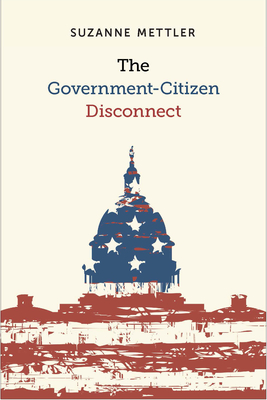

 Russell Sage Foundation
Russell Sage Foundation
The Government-Citizen Disconnect


Key Metrics
- Suzanne Mettler
- Russell Sage Foundation
- Paperback
- 9780871546685
- 9 X 6 X 0.59 inches
- 0.85 pounds
- Political Science > Public Policy - Social Policy
- English
 Secure Transaction
Secure TransactionBook Description
Drawing from original survey data which probed Americans' experiences of 21 federal social policies -- such as food stamps, Social Security, Medicaid, and the home mortgage interest deduction -- Mettler shows that 96 percent of adults have received benefits from at least one of them, and that the average person has utilized five. Overall usage rates transcend social, economic, and political divisions, and most Americans report positive experiences of their policy experiences. However, the fact that they have benefited from these policies has little positive effect on people's attitudes toward government. Mettler finds that shared identities and group affiliations, as well as ideological forces, are more powerful and consistent influences. In particular, those who oppose welfare tend to extrapolate their unfavorable views of it to government in general. Deep antipathy toward the government has emerged as the result of a conservative movement that has waged a war on social welfare policies for over forty years, even as economic inequality and benefit use have increased.
Mettler finds that voting patterns exacerbate the government-citizen disconnect, as those holding positive views of federal programs and supporting expanded benefits have lower rates of political participation than those holding more hostile views of the government. As a result, the loudest political voice belongs to those who have benefited from policies but who give government little credit for their economic well-being, seeing their success more as a matter of their own deservingness. This contributes to the election of politicians who advocate cutting federal social programs. According to Mettler, the government-citizen disconnect frays the bonds of representative government and democracy.
The Government-Citizen Disconnect illuminates a paradox that increasingly shapes American politics. Mettler's examination of hostility toward government at a time when most Americans will at some point rely on the social benefits it provides helps us better understand the roots of today's fractious political climate.
Author Bio
Suzanne Mettler is the John L. Senior Professor of American Institutions in the Government Department at Cornell University. Her research and teaching interests include American political development, inequality, public policy, political behavior, and democracy.
Mettler’s latest book is Four Threats: The Recurring Crises of American Democracy (St. Martin’s Press, 2020), co-authored with Robert C. Lieberman. Earlier books include: The Government-Citizen Disconnect (Russell Sage 2018); Degrees of Inequality: How The Politics of Higher Education Sabotaged the American Dream (Basic Books 2014), The Submerged State: How Invisible Government Programs Undermine American Democracy (University of Chicago 2011), Dividing Citizens: Gender and Federalism In New Deal Public Policy (Cornell University Press 1998) and Soldiers to Citizens: The G.I. Bill and the Making of the Greatest Generation (Oxford University Press 2005). Her books have won numerous prizes, including the Alexander George Book Award of the International Society of Political Psychology; on two occasions, the Kammerer Book Award of the American Political Science Association for the best book on public policy; and the J. David Greenstone Award for the best book on politics and history. Her short essays and op-eds have been featured in popular outlets including the New York Times, Los Angeles Times, Chronicle of Higher Education, and Washington Monthly. She is conducting a panel study of public opinion on the Affordable Care Act, with Larry Jacobs.
Mettler has been elected to the American Academy of Arts and Sciences and awarded Guggenheim and Radcliffe Fellowships. She serves on the steering committee of the Scholars Strategy Network and the board of the American Academy of Political and Social Sciences. She is the former secretary of the American Political Science Association, and president of the organization’s Politics and History and Public Policy sections. She initiated the American Democracy Collaborative, a group of scholars of American political development and comparative politics who are evaluating the health of democracy in the United States.
Research Interests
Suzanne Mettler's research and teaching focus on American political development, public policy, and political behavior. “She is particularly interested in issues pertaining to democracy (both democratization and backsliding), inequality, and citizenship.
Education
- Ph.D. Cornell University, Ithaca, NY; Government, May 1994
- M.A. University of Illinois, Urbana, IL; Political Science, October 1989
- B.A. Boston College, Chestnut Hill, MA; May 1984, Summa Cum Laude
Source: Cornell University - The Department of Government
Videos








Community reviews
Write a ReviewNo Community reviews